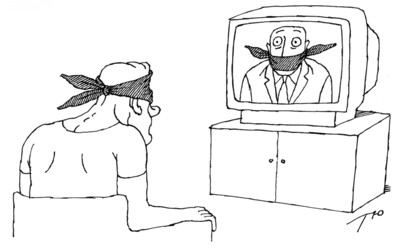
This past week the corporate media chose en masse not to follow two stories of considerable interest to Canadians.
The media normally love polls, but in this case a blanket of silence descended. Frank Graves is a pollster for Ekos. Here are some of his findings, and take note that this poll was conducted before the full fury of Roboscam was upon us:
Nearly a year after the election, Stephen Harper’s majority government is well short of its May 2 position and now tied within the margin of error of the leaderless and supposedly floundering NDP. that CPC support may well be understated since this poll covers 100 per cent of eligible voters — not just the 60 per cent who will actually show up to vote. Even still, with a two-point lead, it’s highly unlikely the CPC would retain its majority in the remote and hypothetical world of another election. Instead, it would be relegated to opposition with an NDP-led coalition.
So a poll that shows the Conservatives in a statistical dead hear with the NDP, which the nodding-in-unison heads in the Parliamentary Press Gallery have either ignored or mocked, does not appear to be newsworthy. Perhaps the corporate media, all of whom but the Toronto Star endorsed Harper in the last election, don’t want to sow panic.
2. The new Anonymous Toews video.
A new video from the Anonymous collective has been posted on YouTube, containing troubling information about a possible conflict of interest when the beleaguered Vic Toews was Minister of Justice. There were a few articles in the corporate media when Anonymous was merely threatening to do it: but nothing has appeared since Anonymous actually made good on its threat:
Aren’t these serious allegations even worth investigating? Or did the Parliamentary Press Gallery know all along? Never mind, tomorrow’s Monday: maybe it’ll be front-page news by then. Or not.
No one is suggesting a conspiracy here, by the way. The notion of groupthink provides more than sufficient explanation. Some news simply “fits,” other news doesn’t. But on the Internet the traditional frames don’t exist, and there are as yet no information gatekeepers.
Perhaps this is what The Guardian was getting at with its “open journalism” concept: a combination of seizing new information-gathering opportunities and collaborating with non-traditional news sources—together with the recognition that this is the path 21st-century journalism must take if it is to survive.
If that’s the case, it would be refreshing to see a little of this kind of journalism practised here in Canada. There’s no smoking these days in the National Press Club, but it’s getting pretty stuffy in there. Maybe open a window or two?
